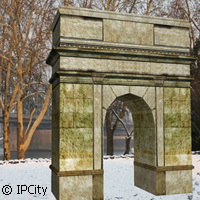Urban mixed reality for better cities
EU-funded researchers have taken science out of the lab and onto the streets to stimulate greater engagement in city living. The IPCITY ('Integrated project on interaction and presence in urban environments') project partners assembled a range of technologies in real-life settings to allow people to discover new aspects of their city and to voice their opinion on future developments. IPCITY was funded EUR 5.27 million under the 'Information society technologies' Thematic area of the Sixth Framework Programme (FP6). The aim of the four-year project was to provide local citizens, visitors and professionals (e.g. local government personnel) with a range of technologies that could be used in urban renewal projects, large-scale events, explorative 'edu-tainment' (education-entertainment), storytelling, and other applications. The technology was developed by the 11-member European consortium as portable and light-weight interfaces that called on a range of disciplines (e.g. cognitive science and anthropology), and assembled in real life settings. The idea behind the IPCITY concept was to foster a collaborative spirit for all participants, particularly with regard to the perspective and future outlook of a given city. In January 2010, the IPCITY partners conducted a trial of the Time Warp technology in Cologne, Germany. Real monuments, cityscapes and famous landmarks were used with the applications to suggest that the 60 participants were caught in a time warp and needed to complete a set of challenges to return to the present date. The participants engaged with 'helper elves' that were invisible to others watching, and interacted in a world caught between the real and the virtual. 'The users quickly got used to the augmented reality technology that they carried, and they would act in odd ways,' explained IPCITY project coordinator Dr Rod McCall from Fraunhofer Institut für Angewandte Informationstechnik (FIT) in Germany. 'Passers-by were often confused about what exactly was going on and even intervened, but it was a convincing and fun experience for the participants.' In fact, Time Warp is normally played in Cologne's Old Town by just two people who assume the role of agents, travel into past and future versions of the same city and encounter challenges along the way. Dr McCall explained that the application brings the game's players into contact with the history and culture of a city. As well as being fun and engaging, it has an educational element. The team's City Tales I application includes a music-based tour known as StreetBeat, where visitors can explore the German capital city of Berlin, while listening to urban music and stories about sub-cultures of the city. For the City Tales II application, the IPCITY researchers were inspired by the success of community-driven content sites such as social networking portals. The application allows users to leave personal stories linked to specific areas of a city, and to contribute to the overall look and feel of the technology itself. In March 2010, the IPCITY team held a final event in Vienna, Austria to showcase the results of the project through a series of performances as well as an exhibition, demonstration, lecture and discussion. Participants were encouraged to experience the systems hands on and to engage in dialogue with the attending researchers. The applications showcased included urban renewal, environmental awareness, location-aware gaming and storytelling. Information on the various applications (including evaluation results) is available on the project's website.
Countries
Germany



